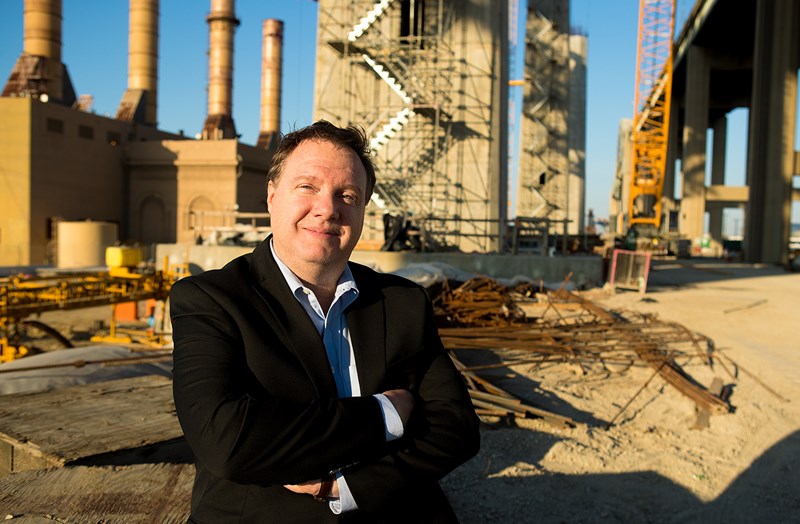News | METRANS Transportation Center Empowers Worker Movement
Stop the VideoNews

Workforce development is a hot topic. A catch-all concept, it means many things to many people. Generally, though, workforce development is an approach that focuses more on the development of worker skills rather than specifically on business proficiencies or best practices. Naturally, the issue then becomes how best to develop worker skills. One Southern California transportation center puts forth an excellent answer...and has for the last 20 years.
“It’s critical to have a broad approach and understand core skillsets that enable people to move in and out of different jobs over the course of their career. And we know from research that that’s increasingly going to be the case. It’s not just about teaching specific skills or disciplines, but also teaching 21st century skills – traditional soft skills plus enhanced data management - and the ability to learn and adapt,” explains Thomas O’Brien, California State University Long Beach-based METRANS Associate Director and Center for International Trade and Transportation (CITT) Executive Director. METRANS is also a WTS-LA Corporate Partner. “And because those skillsets are flexible, they will be useful on jobs we haven’t even identified yet. Things are changing so rapidly, if you put all of your eggs into the one basket of a single job function, you’re likely to hit a brick wall, maybe five or ten years down the road. But if you have a key analytical skill that you can apply to the transport sector, you’ll be much more valuable.”

METRANS Associate Director Dr. Tom O'Brien
Photo by John Livzey
O’Brien would know. Workforce development is central to both his core mission and that of METRANS. The METRANS Transportation Center seeks to “solve transportation problems of large metropolitan regions through interdisciplinary research, education and outreach.” A joint partnership of the University of Southern California (USC) and CSULB, the METRANS Transportation Center concentrates on three primary objects: independent quality research, information dissemination, and training the next generation transportation workforce.
“Tom O’Brien is responsible for workforce development at CSULB and leads the workforce development activities for our new Pacific Southwest Region University Transportation Center,” adds METRANS Associate Director, Administration for METRANS at the USC Sol Price School of Public Policy and active WTS-LA member Victoria Deguzman. “But where he creates programming across a broad base, including pre-college and trades, at USC, we focus more on post-secondary education, career enhancements, and mentoring for people who are working toward or completing 4 year degrees and higher, aiming to bridge the gap between academic theory and practice. Our efforts are complementary and together we cover a wide variety of populations that can benefit from workforce development efforts.”
Photo by John Livzey
Though no fad, workforce development became popular recently for a very profound, yet simple reason. An enhanced workforce delivers greater economic returns for both workers and organizations. It benefits workers tremendously by preparing them for the vagaries of changing technology in the transportation industry. Organizations see greater benefits in productivity and job satisfaction. In Long Beach, O’Brien and his team are currently pursuing a number of workforce development initiatives including supply-chain diversity, new models for work-based learning including next generation apprenticeships, a long-haul trucking program for veterans, and a tribal training initiative in geospatial information systems. But he also believes fervently in the inestimable value of reaching into high schools with workforce development.
Photo by John Livzey
“We’re working on a program in partnership with the Port of Long Beach (POLB) and the Long Beach Unified School district. This gives high school students exposure to logistics for four years. And we do the teacher training, as well as host a leadership camp for 11th graders. And while we’re housed in a state university, our business model is a self-support one. As a result, we must identify education and training programs that have a market; there has to be a stated need for what we do. And that ensures that our workforce development programs will be meaningful to our participants, particularly our high school students who will graduate and either go on to college or go and search for a job within the transportation industry.”
Workforce development means many things to many people. But for Southern California young people and future academics interested in transportation, workforce development means something very specific: a methodology to thrive in the 21st Century transportation industry. Thanks to the concerted efforts of the METRANS teams led by Thomas O’Brien and Victoria Deguzman, the METRANS Transportation Center at CSULB and USC is providing those students and academics with those tools and the necessary guidance to make very real contributions to transportation while enriching their own lives.
News Archive
- December (1)
- November (6)
- October (4)
- September (2)
- August (3)
- July (4)
- June (3)
- May (7)
- April (8)
- March (11)
- February (8)
- January (7)
- December (7)
- November (8)
- October (11)
- September (11)
- August (4)
- July (10)
- June (9)
- May (2)
- April (12)
- March (8)
- February (7)
- January (11)
- December (11)
- November (5)
- October (16)
- September (7)
- August (5)
- July (13)
- June (5)
- May (5)
- April (7)
- March (5)
- February (3)
- January (4)
- December (4)
- November (5)
- October (5)
- September (4)
- August (4)
- July (6)
- June (8)
- May (4)
- April (6)
- March (6)
- February (7)
- January (7)
- December (8)
- November (8)
- October (8)
- September (15)
- August (5)
- July (6)
- June (7)
- May (5)
- April (8)
- March (7)
- February (10)
- January (12)















